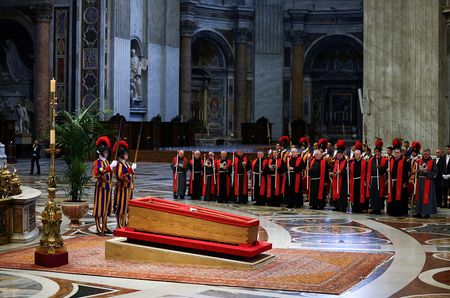By Alan Charlish
WARSAW (Reuters) – When a rival candidate in Poland’s presidential election campaign placed the LGBT community’s rainbow flag on Rafal Trzaskowski’s lectern during a debate, the liberal frontrunner and patron of recent Warsaw Pride marches quickly took it down.
“Recently he has been running away from these symbols,” said Trzaskowski’s opponent, Karol Nawrocki, a conservative historian backed by the nationalist Law and Justice (PiS) party.
Trzaskowski, Warsaw’s mayor, is the candidate backed by Prime Minister Donald Tusk’s Civic Coalition and his victory in the election is key to Tusk’s hopes of implementing his pro-European agenda.
A power stuggle between Tusk and current President Andrzej Duda, a PiS ally, has hampered efforts to roll back the reforms of the previous administration that critics say undermined judicial independence. The president has the power to veto laws.
Trzaskowski, long seen as a high-profile advocate of the liberal causes that motivated young Poles to turn out to elect Tusk’s pro-EU government, now faces potentially risky trade-offs as he tries to win over more conservative voters.
He maintains his support for liberalising some of Europe’s strictest abortion laws, but has talked tough on migration – vowing to deport foreign criminals, reject EU migrant quotas and limit benefits for Ukrainian refugees.
He has also avoided being drawn into debates on gay rights, sidestepping attempts by PiS to paint him as a threat to traditional values in the predominantly Catholic country.
After the incident with the flag, Trzaskowski told the debate that PiS had an “obsession” with gay people and asked Nawrocki about his party’s fears.
Trzaskowski’s team was trying to swerve any topics that could be used to mobilise voters against him, said Rafal Chwedoruk, a political scientist at Warsaw University. “Hence the caution and the shift to the centre in matters such as migration,” he said.
The first round of the vote will be held on May 18 and if no candidate wins more than 50% of the vote a second round run-off will take place on June 1.
“It’s quite clear the centre decides,” said a source close to the Trzaskowski campaign. “When you limit yourself to one radical side … you limit yourself and you are simply not able to win elections.”
RIGHTWARD SHIFT?
The strategy appears to be working among some voters. “I believe this is the right approach in the context of the entire Polish population, which is rather negative about these topics (migration and LGBT rights),” said 46-year-old e-commerce worker Grzegorz, who declined to give his full name.
He said he would vote for Trzaskowski who he regards as a “sensible centre-left politician”.
However, while Trzaskowski is consistently ahead in opinion polls, many younger, liberal voters criticise what they say is his rightward shift.
“It is precisely because of situations like this (with the rainbow flag), changing the previous policies that he promoted, that I was put off him,” said 24-year-old student Aleksander Raczek, who plans to vote for far-left candidate Adrian Zandberg in the first round.
An SW Research poll for news website Onet showed 22.8% of respondents viewed Trzaskowski’s reaction to the rainbow flag incident positively, while 44.1% viewed it negatively.
Raczek says he would still vote for Trzaskowski in a second-round run-off against Nawrocki or the far-right candidate Slawomir Mentzen, who is polling in third place.
But not all left-leaning voters are so sure. Fellow student Wiktor, 22, said he supported Zandberg and may cast a spoiled ballot in the second round.
These sentiments may create obstacles on Trzaskowski’s path to victory, especially if left and centre candidates eliminated in the first round do not endorse him.
“This is one of the most serious risks (for Trzaskowski) at the moment,” said Andrzej Rychard, a sociologist from the Polish Academy of Sciences.
LIBERAL CREDENTIALS
Trzaskowski’s team hopes his track record will speak for itself. As Warsaw’s mayor, he showed his willingness to protect marginalised groups, for example when the PiS government attacked what they described as “LGBT ideology”, a source in his campaign said.
But the PiS party says he is a radical candidate at heart and has accused him of hypocrisy by trying to grab the centre ground.
“We are against his liberal agenda,” said PiS lawmaker Sebastian Kaleta. “But we also see that he would like to erase his biography… and try to present himself right now as a more reasonable politician who understands both sides.”
Highlighting Trzaskowski’s liberal record is also part of a wider strategy to paint the multi-lingual, jazz-loving candidate as a blinkered member of the urban elite.
“These types of messages are also part of the urban (versus rural) divide in Poland,” said Jaroslaw Flis, a political scientist at Jagiellonian University in Krakow. Trzaskowski is trying to avoid the label of a “typical guy from Warsaw” who doesn’t understand the concerns of small-town voters, Flis said.
(Reporting by Alan Charlish; additional reporting by Barbara Erling and Kuba Stezycki; Editing by Ros Russell)











